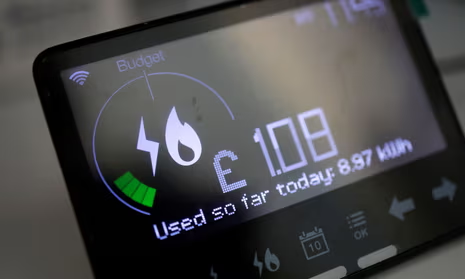
The industry regulator advises households to look into various fixed rate deals that are suitable for them because they are concerned about the UK’s reliance on buying natural gas, which puts the nation at risk of having to pay higher bills.
According to the industry regulator, the energy price cap will increase to an average annual amount of £1,717 starting in October. This news comes at a time when millions of pensioners are also facing the loss of winter fuel payments.
The latest data shows a significant increase in the average amount that households pay for gas and electricity through direct debit. This translates to a monthly increase of £12, or a 10% annual rise.
According to Ofgem, the increase in prices can be attributed to the surge in wholesale petrol prices. Ofgem advises consumers to explore their options and consider fixed-rate deals that may provide potential savings.
The decision will keep the cap, which is adjusted every three months and limits what suppliers can charge per unit of energy, around £500 higher than the average annual bill levels seen before Russia’s invasion of Ukraine.
However, it is projected to be £117 lower than the level in October 2023.
It is possible that the reason chancellor Rachel Reeves decided to discontinue winter fuel payments, which can amount to £300 per year, for approximately 10 million pensioners who do not receive means-tested benefits, including pension credit, is due to this gap.
She attributed the measure, which was announced last month, to the necessity of addressing a significant deficit in public finances. However, it has received widespread criticism, including from members of her own party.

Many charities are expressing concern over the persistently high heating costs, which they believe are contributing to the ongoing cost of living crisis. They fear that this situation will leave many individuals and families facing the difficult decision of choosing between staying warm and having enough food this winter.
According to Citizens Advice research, a sizable number of people may have to turn off their heating and hot water due to rising energy debt levels.
Energy Secretary Ed Miliband expressed concern over the increase in the cap but stood by the decision to implement the cuts.
“The reality is that the state of the public finances forced us to make the decision to allocate the winter fuel payment to those who are most in need.”
“That’s why the government is actively working in the coming months to reach out to the 880,000 pensioners who are eligible for pension credit but have not yet claimed it. The aim is to raise awareness and encourage them to take advantage of this benefit, which will also make them eligible for the winter fuel payment.”
A recent forecast from Cornwall Insight, an energy research consultancy, projects a 3% increase in the cap for the peak use months of January–March, bringing it to £1,762.
Think back to before the COVID pandemic, and you’ll recall that a hesitancy among households to change suppliers played a role in the creation of the energy price cap.
Most households were on default tariffs, often without any choice in the matter. However, those who were able to choose and were financially savvy opted for fixed-rate deals, frequently switching suppliers to lower their bills.
However, they became less visible as numerous suppliers went out of business due to various cost shocks, including the Russian invasion of Ukraine. As a result, most households had to tighten their belts and depend on the price cap.
It’s clear that there are areas for improvement, and Ofgem has once again highlighted the need for reform.
Fixed-rate deals have made a comeback in the energy market this year.
They may be less abundant, but they can provide you with a clear understanding of the costs you will incur throughout the duration of the agreement.
According to the latest data from Ofgem, the number of households taking advantage of this opportunity has increased by one million since April, reaching a total of five million.
According to Uswitch, there are potential savings of around £125 compared to the October price cap level.
Emily Seymour, an energy expert at consumer group Which?, advised: “It is generally advisable to consider deals that are priced around the current price cap, have a duration of no longer than 12 months, and do not come with substantial exit fees.”
According to Ofgem chief executive Jonathan Brearley, the increase in the price cap is expected to pose significant challenges for numerous households. If individuals are having difficulties paying their bills, it is important for them to ensure that they are aware of and have access to all the benefits they are eligible for, such as pension credit. They should also reach out to their energy company for additional assistance and support.
“I would also recommend individuals explore different options and consider opting for a fixed tariff that suits their needs. By doing so, they can potentially save money and enjoy the stability of a fixed rate for a specific duration.”
“We are collaborating with the government, suppliers, charities, and consumer groups to provide comprehensive support to our customers. This includes implementing long-term standing charge reform and taking measures to address debt and affordability concerns.”

“Various options, including potential adjustments to standing charges and increased tariff choices, are being considered to provide customers with more control over their energy usage. However, it is important to note that there is no one-size-fits-all solution.”
“It is crucial to gather feedback on our proposals and collaborate with the government to explore potential targeted assistance that could benefit customers, considering the potential impact on low-income households.”
Our reliance on a highly unpredictable global gasoline market, which is susceptible to changes due to unforeseen international events and the actions of assertive nations, is the reason for the price increase we are announcing today. Creating a domestic renewable energy system is crucial for reducing costs and establishing a stable and environmentally friendly market that benefits consumers.
The government’s energy strategy involves implementing measures to reduce the country’s reliance on natural gas for heating and electricity by prioritising the expansion of onshore wind power.
According to Jess Ralston, the head of energy at the Energy and Climate Intelligence Unit, there has been insufficient progress in energy efficiency and heat pump adoption. As a result, our dependence on gas has not decreased significantly in recent years, even though international market fluctuations have led to a sharp increase in bills.
The new government has taken some measures towards renewables, but it has yet to announce its intentions regarding home heating or insulation. It is evident that time is of the essence.
“If we don’t take action to decrease our gasoline consumption, our reliance on foreign imports will continue to increase.” The North Sea oil and gas is sold on international markets to the highest bidder, which unfortunately does not contribute to our bills or energy independence.
“Given the removal of the winter fuel payment for certain pensioners coinciding with increasing bills, it is anticipated that some individuals may face difficulties. It remains uncertain whether the government will implement measures to assist those most affected by the removal of the winter fuel payment.”